Frailing Banjo Video
Lessons
Weekly lessons
Old Time Banjo with
Pat & Patrick Costello
The groundbreaking video workshop now freely available under a Creative
Commons License.
This is the free online Creative Commons licensed edition of "The Outlaws & Scalawags Songbook".
This book was originally released as the first in a series of frailing banjo songbooks, but every time I got around to thinking about releasing the second and third volumes (a gospel songbook titled "Say Amen, Somebody!" and a collection of sea songs that still needs a title because Dear Old Dad didn't think "Is That A Parrot On Your Shoulder Or Are You Just Happy To See Me?" was appropriate) I wound up getting wrapped up in another project. After a while the Sing Along Banjo idea was put to rest in favor of putting together a larger songbook that would combine simple folk tunes with basic instruction on a wide variety of instruments. That book (no, I'm not going to tell you the title yet) should hit the streets in late 2005. Until then putting Outlaws & Scalawags online just seemed like a good idea.
Anyway, the idea behind the Sing Along Banjo series was to provide banjo students with songs in two different versions. A simple "bump dit-ty" version to back up your voice and a second version that features an easy melody break. Each melody break as a MIDI file attached to make working with the tab easier.
One thing I should say here is that the tab in this document is nothing more than a learning tool. Don't work through these files with the intention of memorizing each tune. Frailing banjo is an improvisational approach to music (The How and the Tao of Old Time Banjo and A Book Of Five Strings have more information on this) and the tabulature here is only intended to serve as a rough outline of one way to play the song. Change things in any way you want to. Change the key, fancy up or simplify a melody and do whatever you want to (as long as you are making musical sense) to make the song "yours".
This document is covered by a Creative Commons license. Here is a summary of the license:
You are free:
* to copy, distribute, display, and perform the work
Under the following conditions:
Attribution. You must give the original author
credit.
Noncommercial. You may not use this work for commercial
purposes.
No Derivative Works. You may not alter, transform, or build
upon this work.
* For any reuse or distribution, you must make clear to others the
license terms of this work.
* Any of these conditions can be waived if you get permission from
the copyright holder.
Your fair use and other rights are in no way affected by the
above.
This is a human-readable summary of the Legal Code (the full
license).
Here is the full license:
THE WORK (AS DEFINED BELOW) IS PROVIDED UNDER THE TERMS OF THIS CREATIVE COMMONS PUBLIC LICENSE ("CCPL" OR "LICENSE"). THE WORK IS PROTECTED BY COPYRIGHT AND/OR OTHER APPLICABLE LAW. ANY USE OF THE WORK OTHER THAN AS AUTHORIZED UNDER THIS LICENSE OR COPYRIGHT LAW IS PROHIBITED.
BY EXERCISING ANY RIGHTS TO THE WORK PROVIDED HERE, YOU ACCEPT AND AGREE TO BE BOUND BY THE TERMS OF THIS LICENSE. THE LICENSOR GRANTS YOU THE RIGHTS CONTAINED HERE IN CONSIDERATION OF YOUR ACCEPTANCE OF SUCH TERMS AND CONDITIONS.
1. Definitions
2. Fair Use Rights. Nothing in this license is intended to reduce, limit, or restrict any rights arising from fair use, first sale or other limitations on the exclusive rights of the copyright owner under copyright law or other applicable laws.
3. License Grant. Subject to the terms and conditions of this License, Licensor hereby grants You a worldwide, royalty-free, non-exclusive, perpetual (for the duration of the applicable copyright) license to exercise the rights in the Work as stated below:
The above rights may be exercised in all media and formats whether now known or hereafter devised. The above rights include the right to make such modifications as are technically necessary to exercise the rights in other media and formats, but otherwise you have no rights to make Derivative Works. All rights not expressly granted by Licensor are hereby reserved, including but not limited to the rights set forth in Sections 4(d) and 4(e).
4. Restrictions.The license granted in Section 3 above is expressly made subject to and limited by the following restrictions:
For the avoidance of doubt, where the Work is a musical composition:
5. Representations, Warranties and Disclaimer
UNLESS OTHERWISE MUTUALLY AGREED BY THE PARTIES IN WRITING, LICENSOR OFFERS THE WORK AS-IS AND MAKES NO REPRESENTATIONS OR WARRANTIES OF ANY KIND CONCERNING THE WORK, EXPRESS, IMPLIED, STATUTORY OR OTHERWISE, INCLUDING, WITHOUT LIMITATION, WARRANTIES OF TITLE, MERCHANTIBILITY, FITNESS FOR A PARTICULAR PURPOSE, NONINFRINGEMENT, OR THE ABSENCE OF LATENT OR OTHER DEFECTS, ACCURACY, OR THE PRESENCE OF ABSENCE OF ERRORS, WHETHER OR NOT DISCOVERABLE. SOME JURISDICTIONS DO NOT ALLOW THE EXCLUSION OF IMPLIED WARRANTIES, SO SUCH EXCLUSION MAY NOT APPLY TO YOU.
6. Limitation on Liability. EXCEPT TO THE EXTENT REQUIRED BY APPLICABLE LAW, IN NO EVENT WILL LICENSOR BE LIABLE TO YOU ON ANY LEGAL THEORY FOR ANY SPECIAL, INCIDENTAL, CONSEQUENTIAL, PUNITIVE OR EXEMPLARY DAMAGES ARISING OUT OF THIS LICENSE OR THE USE OF THE WORK, EVEN IF LICENSOR HAS BEEN ADVISED OF THE POSSIBILITY OF SUCH DAMAGES.
7. Termination
8. Miscellaneous
When I was a kid my father used to hang around with an old banjo-playing beatnik who had left the Washington Square scene to make his home in suburban Philadelphia. Dear old dad was just starting on the banjo back then and his buddy would occasionally help him tab out a song or two in this funky little notebook that dad kept in his banjo case. By the time I decided to take a shot at playing the banjo that notebook had a handful of songs in it and I wound up swiping it from time to time because it was the only 'frailing tab' I could find.
As my first book, "The How and the Tao of Old Time Banjo," began to circulate I started getting notes from people asking for more songs. I figured the best way to answer that request would be to put something together along the lines of that old notebook, which is still here in our studio after all these years. I didn't want to just copy the old notebook because there really weren't that many songs and we've learned a lot more in the past twenty-five years. In the end I decided to group songs under general headings like Gospel, Train songs and, in this first volume, Outlaws & Scalawags. In the next few pages you will find some advice on how to use this book along with a chord chart and some licks to experiment with. After that the book dives right into the songs. Where applicable I've included a back-up version and a melody line version. For songs that are fairly simple there is just one version.
You don't need to know a whole heck of a lot to start having fun with the songs in this book. If you know some chords and can play the basic frailing strum you have enough to get started. I would recommend that you take it slow and don't rush into the melody arrangements right off the bat. The melody line is neat but the rhythm of the tune is the part you have to get right in order to play with other people.
Keep in mind that the idea here isn't to play the songs exactly as written. The melody lines tabbed out in this book are just suggestions. Change things. Add or remove some hammer-on's and pull off's. Change the key. Change the tempo. Shoot, you can even change the lyrics if you want to. That's what makes these old songs so enjoyable. Everybody adds his or her own ideas into the mix. Have fun with the songs, get out there and pick, don't forget to sing and never step in anything soft!
Patrick Costello
August 23, 2003
The songs in this book are arranged for frailing banjo. "frailing" is a banjo style that is also referred to as clawhammer, old time, drop thumb and a few other names. The basic concept of the style is that you are picking down (towards the floor) with your fingernail across the strings to create a rhythmic pattern.
I don't have the space available for a complete frailing banjo lesson here (this is a songbook after all) but I can give you enough information to get started. For a complete overview of the style I would suggest ordering a copy of For more information on these techniques pick up a copy of "The How and the Tao of Old Time Banjo" from http://www.pik-ware.com.
The first step is getting in tune. With few exceptions the songs in this book are played out of open G tuning. When you are tuning your banjo you should know how the strings are numbered. The short string is the fifth string. When you are holding your banjo the fifth string will be on top and the first sting will be closest to the floor.
Your banjo is tuned to an open G chord.
Be sure to have the string ringing when you crank on your tuning pegs. This helps you avoid tightening the string past its' breaking point.
To tune your banjo without a tuner just follow these steps:
Once you are in tune hold your banjo in your lap with the pot (or resonator) flat against your belly. Not off to the side, not on your knee. I'd also suggest using a strap while you do this so your hands are not holding up the banjo. Bring your banjo neck up so that the fifth peg is up by your ear. If you were facing a clock you'd want the neck at 10 or 11. For right now your left hand isn't going to have too much to do. Chords come later and then your left hand will be quite busy. For right now just let you left hand gently grasp the banjo neck and focus on your right hand technique.
Hold your right arm out and make a fist. Now stick out your index finger and thumb just like when you were a kid playing cops and robbers. You want that sort of 'gun' shape. Don't clench your remaining three fingers to your palm but rather try to relax and keep everything kind of loose. Tension just slows things down. The middle finger should be a hair extended.
Look at your hand. You've got your thumb up, your index finger straight out, your middle finger loosely curled and the last two fingers lightly touching your palm. Now that you've got your hand into a rough frailing shape you can lay that that whole arrangement of fingers onto your banjo head.
Put the pad of your thumb on the fifth string so that it is an inch or two from the rim and rest your middle fingernail on the first string.
Now take a look at your hand. You should see that you can just raise it up a hair and drop that middle fingernail down to strike the first string. Do that a few times.
Don't flail around or open and close your hand or flick your fingers. Just use your thumb as a sort of pivot point to rear back (you won't have to go very far) and swing on down to strike the string with your nail. Let the string sort of snap off the fingernail. Once you get comfortable with the idea of dropping your hand down to strike the first string try the same thing on your second, third and fourth strings. To hit those inside strings - well, look at your hand again. Your thumb is lying on the fifth string. If you close that webbing between your index finger and thumb you should see that you can swing you hand so that it's over the string you want to hit. We're not talking big motion here. It's just a hair this way and a hair that way. Do this for a while and get used to the motion. After the strike the next step is the strum
Hit a string. Any string. Then close the webbing between your thumb and index finger so that your hand comes back over the strings and your middle fingernail is over the third or fourth string. While all of this is happening keep your thumb in place. Once you've reared back enough (three strings is a safe bet) strum down across the strings with your middle fingernail. So it's pick, rear back, strum.
Do that a few times. Get used to it. Keep the thumb in place on the fifth string. As you pick and as you strum it's a good idea to keep a sort of straight wrist. Your forearm is doing all of the work here using your thumb as a pivot point. As you complete the strum you'll see that your thumb is putting pressure on the fifth string. Snap your thumb off the fifth string with a rolling motion and drop it back. Once your thumb drops back the pick and strum combination repeats. Remember to maintain hand position and to drive your hand across the strings with your forearm. Do not flick your fingers. Play steady and slow.
Let's give each major part of the frailing strum a label of some sort. We'll call the pick "bump," the strum "dit" and the thumb rolling off the fifth string "ty." When you practice the basic strum it will help you get into the rhythm if you call out the name for each part of the strum.

The basic strum is broken into a quarter note and two eighth notes. I don't want to get into note values here (it's covered extensively in "The How and the Tao of Old Time Banjo") but you can get an idea of the rhythm if you tap your foot while you practice the basic strum:
On the bump tap your foot. Bring your foot back up. (quarter note) As you tap your foot again do your strum. (eighth note) As your foot is coming back up thumb the fifth string for the ty. (eighth note) Once you can play that picking pattern fairly well the next thing to work on is changing chords
Over the tab you will find chord diagrams. The box shows the first four strings of your banjo neck and the first four frets. The strings are numbered 4-3-2-1 (left to right) with 1 being your first string. The dark line on top represents the nut on your banjo neck. The "0" symbols on top of the diagram tell you to play that string open. The black dots tell you where your fingers go.
The seven chord diagrams shown here are used throughout the book. Give yourself some time to get used to playing the frailing strum while changing through these chords. As you get more comfortable you can explore the chord chart featured later on in this introduction.
![]()
The songs in this book are written out in tablature. Tablature, or 'tab' for short, is just a way of writing a song down. You have five lines. Each line represents a string on your banjo. The fifth string is at the bottom and the first string is on top.
![]()
When any string has a zero you play that string open. The numbers on a string tell you what fret to play. So in this example you would play your fifth string at the fifth fret, your fourth string at the fourth fret, your third string at the third fret and so on. A series of numbers running one on top of the other tells you to strum a chord (dit.)
In order to make things easier I will add a rhythm line over some of the tab files. A measure of bump dit-ty's in open G looks like this:
![]()
And this shows the same measure in C:
![]()
Note: The strum (dit) portion of the frailing stroke will usually be made out of a chord form
A hammer-on is when you, well, hammer your finger down on a string. In tab it's marked out with an H. Most of the time you will strike a string and play a hammer-on while the string is still ringing.

Once in a while you will run across a group of notes where you are striking one string and hammering on a different string. I usually refer to this kind of hammer-on as a "phantom hammer-on."

A pull-off is when you quickly pull-off your finger after playing a fretted note. It is marked out with a P.

A slide is when you play a fretted note and then slide your finger down the fretboard as the note is still ringing. It is marked out with a sl.
![]()
For more information on these techniques pick up a copy of "The How and the Tao of Old Time Banjo" from http://www.pik-ware.com or the Old Time Banjo Deluxe CD ROM video workshop.
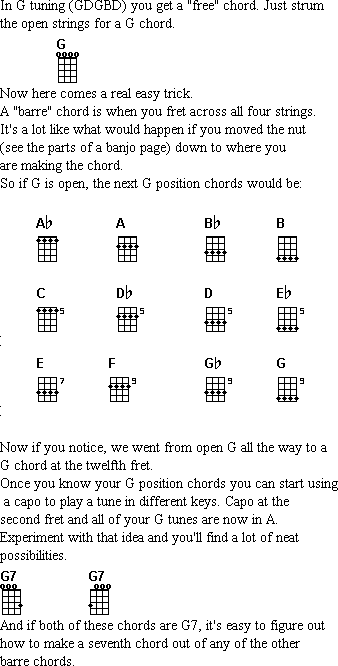
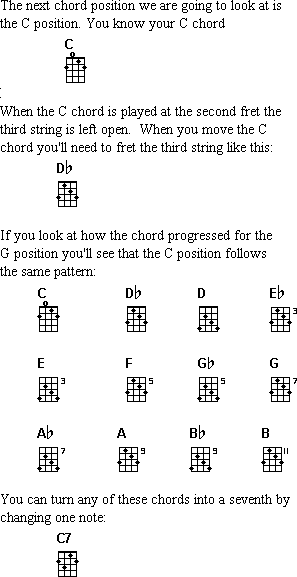
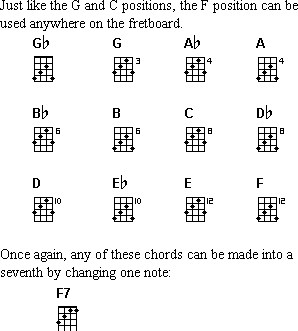
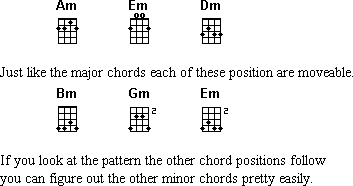
With a few exceptions each of the songs presented here are laid out in two versions. The back up version is a bare-bones arrangement with a simple bump dit-ty accompaniment. In a lot of situations this is really all you need to play and sing the song.
The melody version is offered with the melody line incorporated into the bump dit-ty strum. One thing to keep in mind with the melody version is that you don't have to play the song as written. In fact, a big part of playing the banjo is getting used to the idea that there are countless ways to play a song. The only "right" way depends on how you feel at the moment. You can add or take away hammer-on's, slides or pull-off's to suit your taste.
Also keep in mind that the key signature of a song isn't a big deal. If you can't sing in the key shown get out a capo or transpose the song into a more suitable key signature. For information on transposing, once again, I would suggest ordering a copy of "The How and the Tao of Old Time Banjo" from http://www.pik-ware.com
"What if I don't know the song?"
In a lot of cases you can get a feel for how a song sounds by looking at the rhythm of the lyrics and the chord progression. That's how I learned a lot of songs when I was starting out and it still tickles me that most of the time I was pretty close to hitting the mark. Now let's get picking!
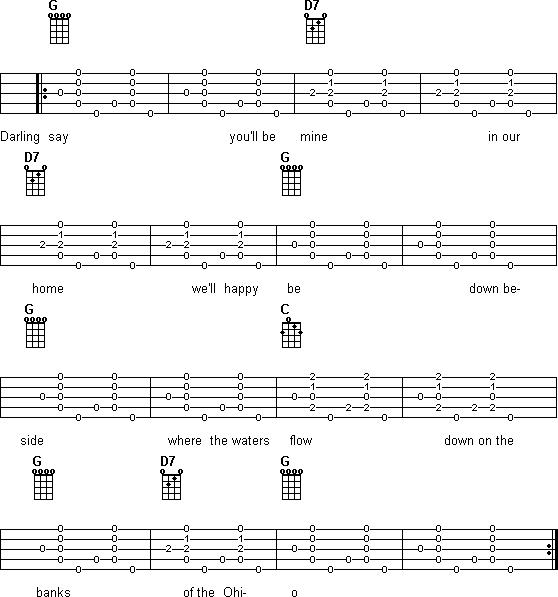
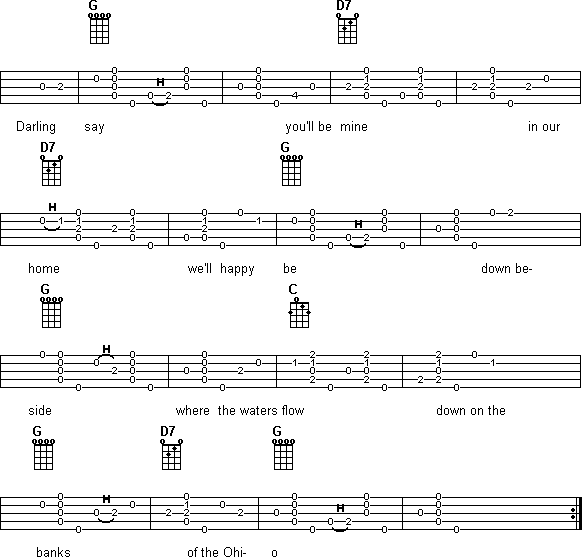
Chorus:
Darling say that you'll me mine,
In our home we'll happy be.
Down beside where the waters flow,
Down on the banks of the Ohio.
I asked my love to take a walk,
Just to walk a little way,
And as we walk, oh may we talk
About our golden wedding day.
I asked your mother for you, dear,
She said you were too young to wed.
Only say that you'll be mine.
Happiness in my home you'll find.
I took her by her lily-white hand,
Led her down where the waters stand.
I picked her up and threw her in,
Watched her as she floated down.
I went back home between twelve and one,
Crying: "My God, what have I done?
I murdered the only girl I love,
Because she would not marry me."
The very next morning about half past four,
The sheriff's man knocked on my door.
"Now young man, come now and go,
Down to the banks of the Ohio."
Before we move on to the next song let's take a look at how something as simple as adding a slide and a few more hammer-on's and pull-off's can change the way a song plays
The opening measures of this next arrangement of "Banks Of The Ohio" start with a slide on the third string at the second fret to the fourth fret. This gives you the same basic notes that you played in the melody arrangement- but by sliding into the note rather than just picking it you create an effect that can add a lot of impact on how 'vocal' a instrumental break can sound.
As you play the other songs in this book don't be afraid to add a slide or any other technique into a tune. The whole idea is to play what you feel.
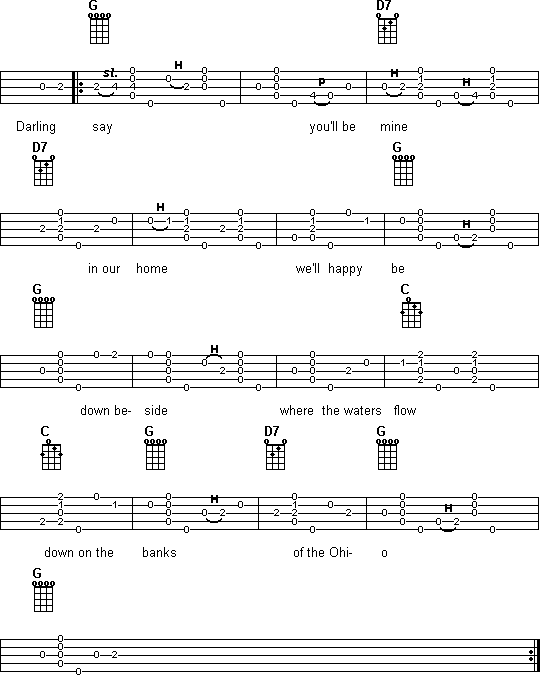
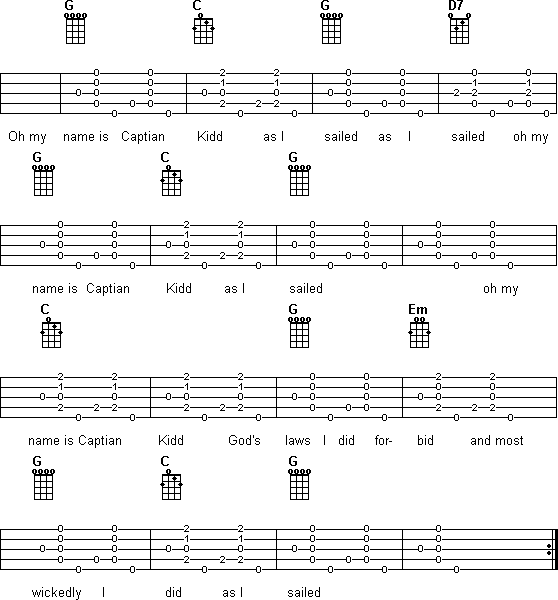
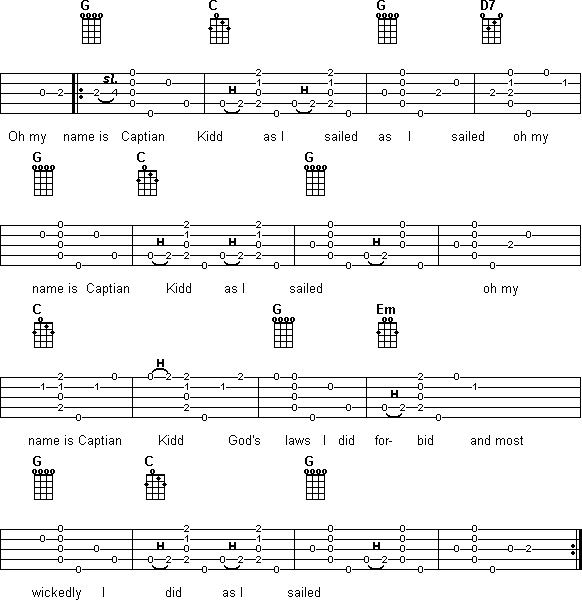
Oh my name is Captain Kidd
As I sailed, as I sailed
Oh my name is Captain Kidd as I sailed
Oh my name is Captain Kidd
God's laws I did forbid
And most wickedly I did as I sailed
My parents taught me well
As I sailed, as I sailed
Oh my Parents taught me well as I sailed
Oh my parents taught me well
To shun the gates of hell
But against them I rebelled as I sailed
I murdered William Moore
As I sailed, as I sailed
Oh I murdered William Moore as I sailed
Oh I murdered William Moore
And I left him in his gore
Forty leagues from the shore as I sailed
And being crueler still
As I sailed, as I sailed
Oh and being crueler still as I sailed
Oh and being crueler still
My gunner I did kill
And his precious blood did spill as I sailed
And being nigh to death
As I sailed , as I sailed
And being nigh to death as I sailed
And being nigh to death
I vowed with every breath
To walk in wisdom's way as I sailed
My repentance lasted not
As I sailed, as I sailed
My repentance lasted not as I sailed
My repentance lasted not
My vows I soon forgot
Damnation was my lot as I sailed
Now, to the execution dock
I must go, I must go
To the execution dock I must go
To the execution dock
Lay my head upon my block
No more the laws I'll mock as I sailed, as I sailed
You will notice that one of the chord diagrams is marked "D variation." This is simply a D chord with the first and fourth strings open. In order to make the fourth string pull-off's easy to reach I figured using a partial D chord was the way to go. If the double open drone strings sound a little 'off' to your ear go ahead and use a full D. If the D chord gives you fits either way just use a D7. It'll work no matter how you do it.
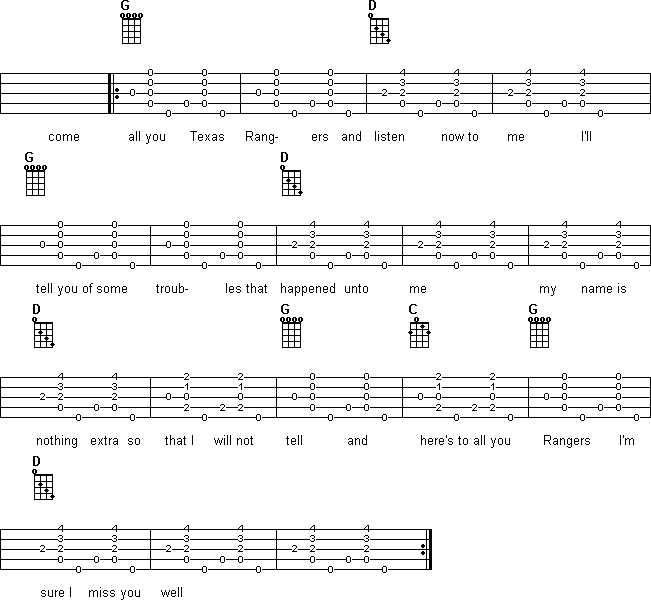
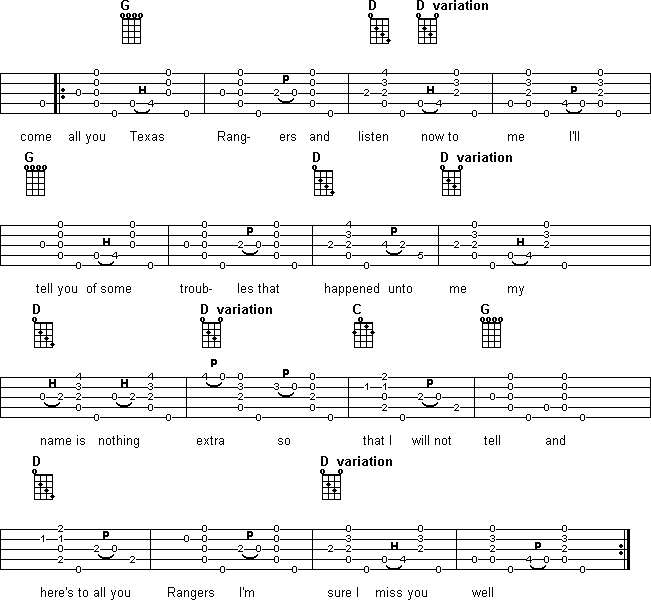
Come all you Texas Rangers and Listen now to me
I'll tell you of some troubles that happened unto me
My name is nothing extra so that I will not tell
And here's to all you Rangers I'm sure I miss you well.
'Twas at the age of seventeen I joined the jolly band
We marched from San Antonio down to the Rio Grande
Our captain he informed us, perhaps he thought it right
"Before we reach the border, boys, I'm sure we'll have to
fight."
And then the bugle sounded, our captain gave commands,
"To arms, to arms" he shouted, "And by your horses stand"
I saw the glittering lances, their arrows around me flew
And all my strength, it left me, and all my courage too.
I saw the Indians coming, I heard them give a yell
My feelings at that moment no tongue can ever tell
I saw the smoke ascending, it seemed to reach the sky
And then the thought it struck me, my time had come to die.
We fought for nine hours fully before the strife was o'er
The likes of dead and wounded I never say before
And when the sun had risen and the Indians they had fled
We loaded up our rifles and counted up our dead.
And all of us were wounded our noble captain slain
The sun was shining sadly down on the bloody plain
Sixteen brave Rangers, the bravest in the West
Were buried by their comrades with arrows in their chests.
And now my song has ended I guess I've sung enough
The life of any Ranger you see is very tough
And if you have a mother who don't want you to roam
I advise you by experience you'd better stay at home
The only tricky part is the layout of the second and third
verses. For those two verses
you play the chord progression through once and then go back and
repeat measures
eight through sixteen.
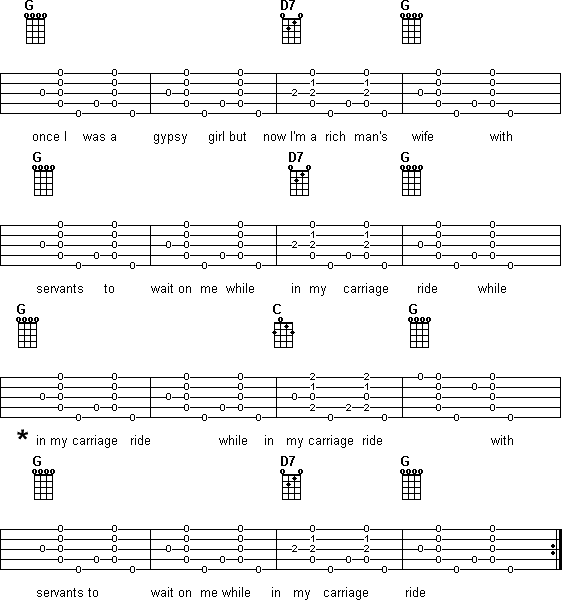
*= for the tag on the second and third verse repeat the song starting here
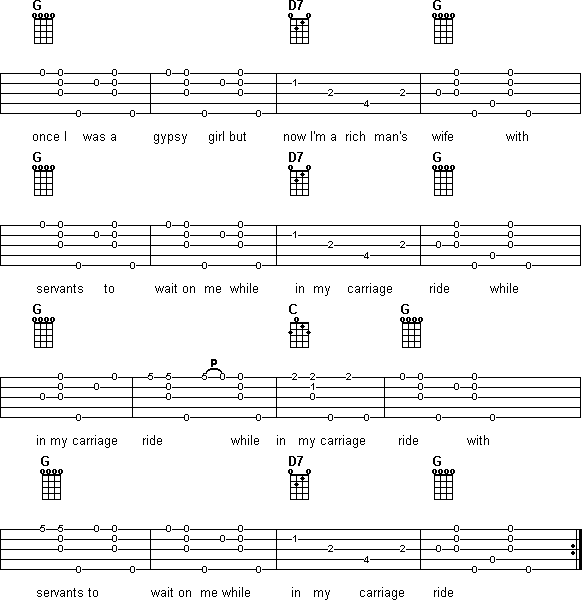
*= for the tag on the second and third verse repeat the song starting here
Once I was a gypsy girl but now I'm a rich man's bride
With servants to wait on me while in my carriage ride
While in my carriage ride, while in my carriage ride
With servants to wait on me while in my carriage ride
As I went a strolling one day down London's streets
A handsome young squire was the first I chanced to meet
He kissed my pretty brown cheeks that no he loves so well
And said my little gypsy girl will you my fortune tell?
*Will you my fortune tell, will you my fortune tell?
He said my little gypsy girl will you my fortune tell?
Oh yes sir, kind sir, please hold to me your hand
You have many fine mansions in many foreign lands
And all those fine young ladies, you can cast them all aside
I am the gypsy girl who is to be your bride.
*Who is to be your bride, who is to be your bride
I am the gypsy girl who is to be your bride.
Once I was a gypsy girl but now I'm a rich man's bride
With servants to wait on me while in my carriage ride.
* While in my carriage ride, while in my carriage ride
With servants to wait on me while in my carriage ride.
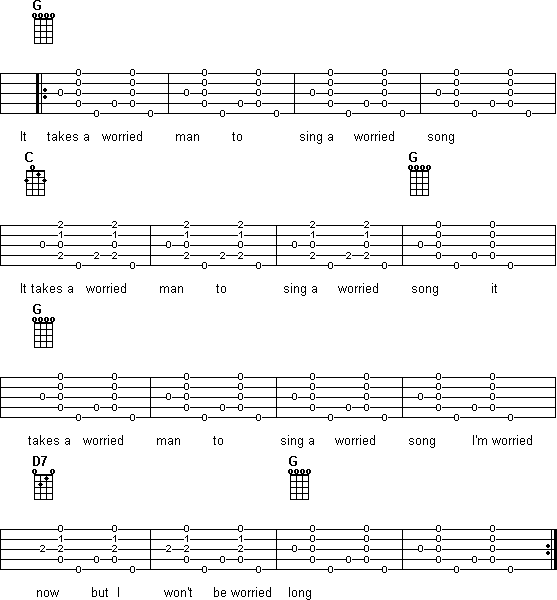
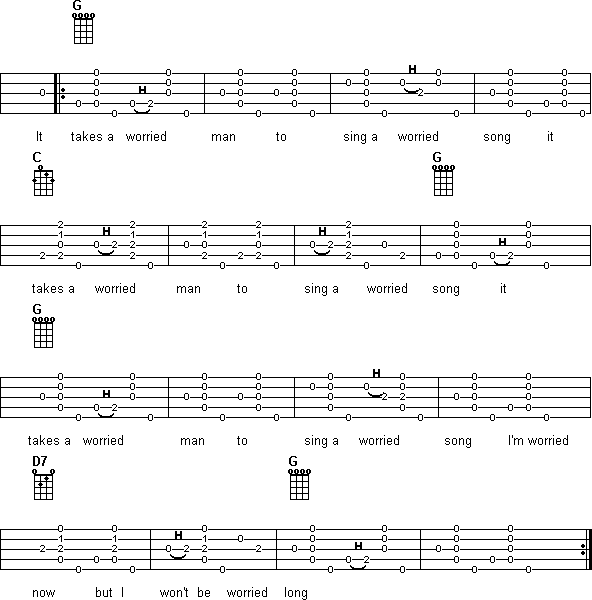
It takes a worried man to sing a worried song
It takes a worried man to sing a worried song
It takes a worried man to sing a worried song
I'm worried now, but I won't be worried long
I went across the river and lay myself to sleep
I went across the river and lay myself to sleep
I went across the river and lay myself to sleep
When I woke up, had shackles on my feet
Twenty nine links of chain around my leg
Twenty nine links of chain around my leg
Twenty nine links of chain around my leg
And on each link, an initial of my name
I asked that judge, tell me, what's gonna be my fine
I asked that judge, tell me, what's gonna be my fine
I asked that judge, tell me, what's gonna be my fine
Twenty-one years on that Rocky Mountain line
If anyone should ask you, who made up this song
If anyone should ask you, who made up this song
If anyone should ask you, who made up this song
Tell 'em it was me, I sing it all day long
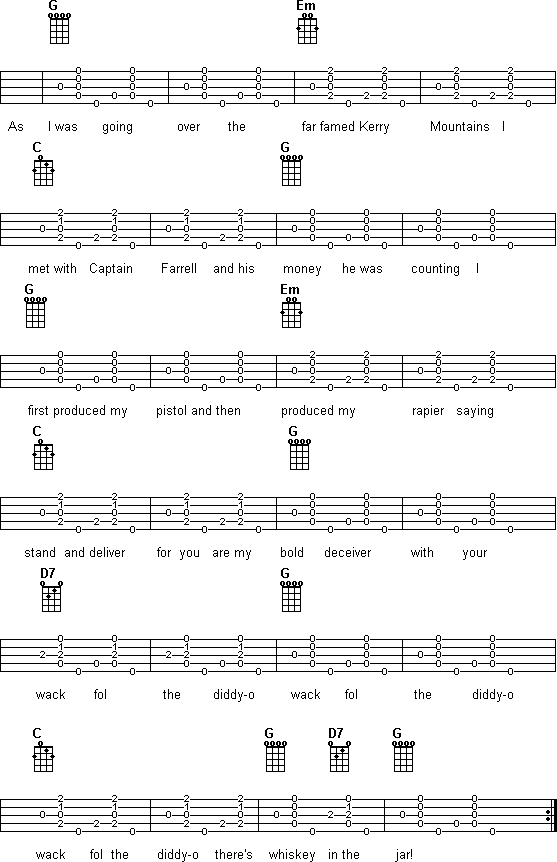
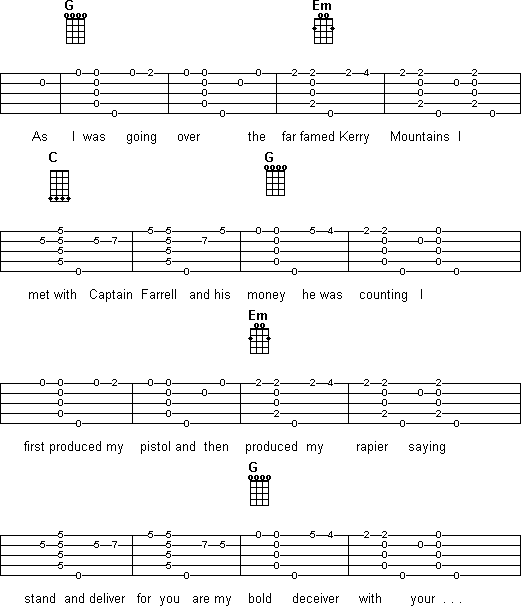
As I was going over the far famed Kerry mountains
I met with Captain Farrell and his money he was counting
I first produced my pistol and then produced my rapier
Saying stand and deliver for I am your bold deceiver with your . .
.
Chorus:
Whack fol the diddy-oh
Whack fol the diddy-oh
Whack fol the diddy oh
There's whiskey in the jar!
He counted out his money and it made a pretty penny
I put it in my pocket and I gave it to my Jenny
She sighed and she swore that she never would decieve me
But the devil take the women for they never can be easy
I went into my chamber for to take a slumber
I dreamt of gold and jewels and sure it was no wonder
But Jenny took my pistols and filled them up with water
And sent for Captain Farrell to be ready for the slaughter
'Twas early in the morning before I rose to travel
The guards were all around me and likewise Captain Farrell
I then produced my pistols for she stole away my rapier
But I couldn't shoot the water so a prisoner I was taken
They threw me in the jail without judge or jury
For robbing Captain Farrell in the famed Kerry mountains
But they didn't take my fists so I knocked the sentry down
And bid a fond farewell to that jail in Salem town
If anyone can aid me, it's my brother in the army
I think that he is stationed in Cork or in Killarney
And if he'd come and join me, we'd go rovin' in Kilkenny
I swear he'd treat me fairer than my darling sporting Jenny
Now some take delight in fishing or in roving
Others take delight in the carriages a-rolling
But I take delight in the juice of the barley
And courting pretty maidens in the moring bright and early
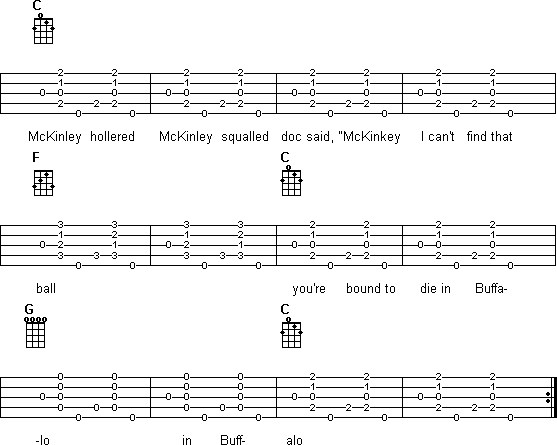
For the back up version of this tune I used the basic position C
and F chords to keep
things simple. This will work fine in a jam session but to play
the melody in the key of C
you will want to use the bar chord at the fifth fret as shown in
the melody arrangement
on the next page.
One other thing to keep in mind is that almost everybody has a
hard time mastering the
jump from the fifth fret C chord up to the F chord. The best
solution I've found is to
make a D7 chord first and then drop your ring or little finger on
the first string, third
fret.
Take your time with this one. It is a great old song.
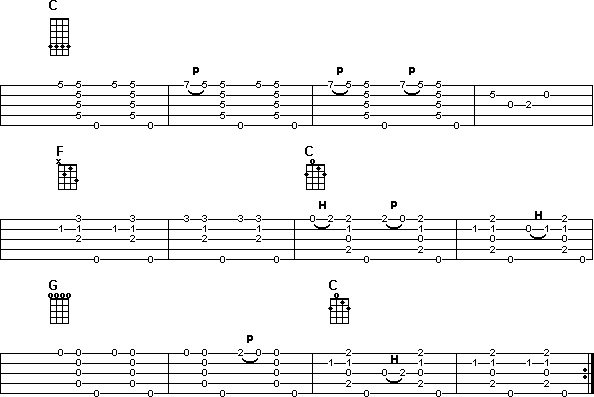
McKinley hollered, McKinley squalled
Doc said "McKinley, I can't find that ball
You're bound to die, In Buffalo"
Look here you rascal, see what you've done
You shot my husband with your Ivers-Johnson gun
I'm taking you back, to Washington
The doc came a running pulling off his specs
Doc said "McKinley better cash in your checks
You're bound to die, In Buffalo"
The train, the train, blowing down the line
Whistling every station McKinley's a dying
From Buffalo, to Washington
Forty-four boxcars trimmed in lace
Put him in the last one so we can't see his face
From Buffalo, to Washington
Roosevelt's in the White House doing his best
McKinley's in the graveyard taking a rest
He's gonna be gone, a long old time
Roosevelt's in the White House drinking out a silver cup
McKinley's the graveyard, he'll never wake up
He's gonna be gone, a long old time
Czolgosz, Czolgoz, mighty mean man
You shot McKinley with a flower in his hand
He's gonna be gone, a long old time
Hush up you children, don't you fret
You'll draw a pension at your daddy's death
He's gonna be gone, a long old time
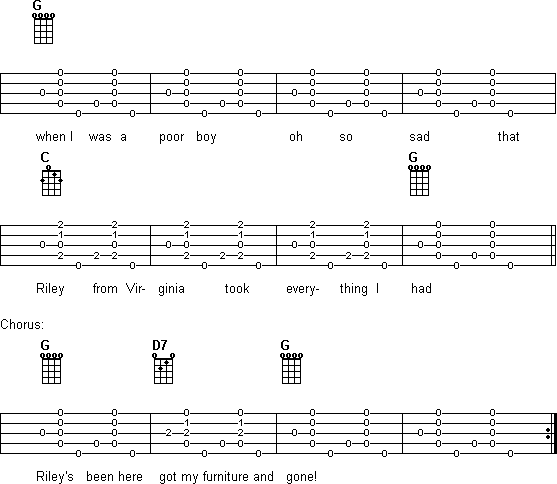
Writing down a break for a song like "Riley The Furniture Man"
is a tricky prospect
simply because there are so many ways you can go about playing
this song. For the
melody arrangement presented here I kept things pretty simple but
don't be afraid to
try some different ideas of your own. With a song as raucous as
this one just about
anything goes.
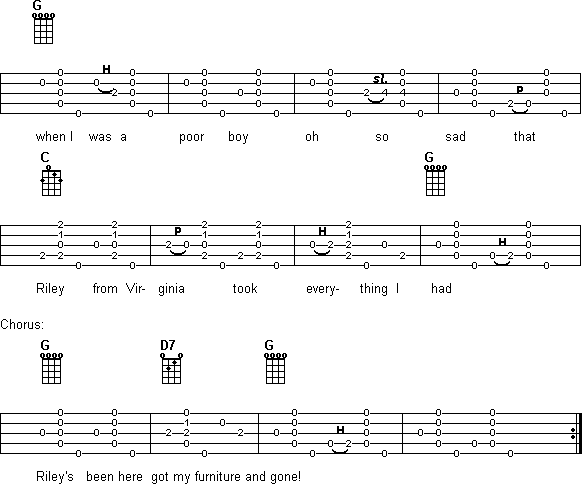
When I was a poor boy, oh so sad
That Riley from Virginia took everything I had
Riley's been here, got my furniture and gone!
Riley come to my house and these are the words he said
"Throw that cracker driver out and load that poster bed"
Riley's been here, got my furniture and gone
It makes no difference to a rich man with all his fancy
clothes
If you don't pay Mr. Riley you've got no place to go
Riley's been here, got my furniture and gone!
Riley he's a rich man off poor folks like me
Every Sunday morning Riley gives to charity
Riley's been here, got my furniture and gone!
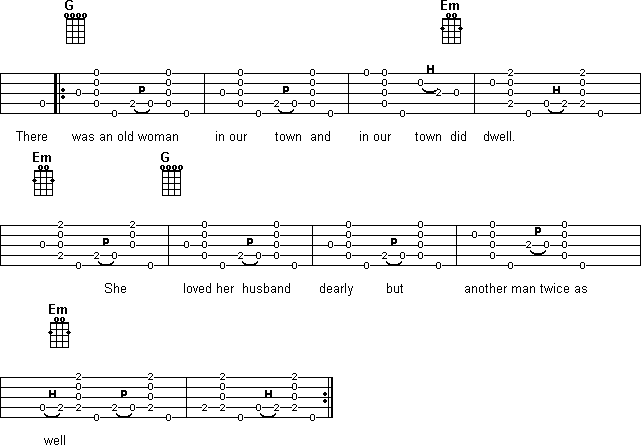
There was an old woman in our town
And in our town did dwell
She loved her old man dearly
But another man twice as well
She went down to the doctor
To see what she could find
To see what she could find
To make her old man blind
"Feed him eggs and marrowbone
And make him sup them all
It won't be too long before
He won't see you at all"
She fed him eggs and marrowbone
And made him sup them all
And it wasn't too long before
He couldn't see her at all
"Now that I am old and blind
And tired of my life
I'll go to the rivers edge
And there I'll end my life"
"To drown yourself, to drown yourself
Now that would be a sin
So I'll go with you to the rivers edge
And there I'll push you in"
The old woman took a running jump
To push the old man in
The old man he stepped aside
And the woman she fell in
She cried for help, she screamed for help
And loudly she did bawl
The old man said "I'm so blind
I can't see you at all!"
She swam along, she swam along
Till she came to the rivers brim
The old man got a great long pole
And pushed her further in
Now the old woman is dead and gone
And the Devil's got her soul
Wasn't she a gosh-darn fool
That she didn't grab that pole?
Eating eggs and marrowbone
Won't make your old man blind
So if you want to do him in
You must sneak up from behind
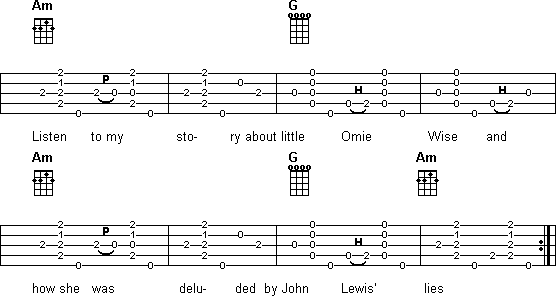
Oh listen to my story about little Omie Wise
And how she was deluded by John Lewis' lies
He promised to meet her at Adamses' Springs
He promised her money and other fine things
He gave her no money, but flattered the case
Saying, "We will get married, 'twill be no disgrace"
"John Lewis, John Lewis, please tell me your mind
Do you mean to marry me or leave me behind?"
"Little Omie, little Omie, I'll tell you my mind
My mind is to drown you and leave you behind"
He beat her and he banged her 'til she could hardly go
Then threw her in the river where the fast waters flow
Two little boys went fishing just at the break of dawn
They saw little Omie come floating along
They arrested john Lewis, thye arrested him today
They buried little Omie down in the cold clay
"My name is John Lewis, my name I'll never deny
I murdered little Omie now I'm condemned to die
"go hang me, go kill me for I am the man
who murdered little Omie down by the mill dam"
I combined the back up and melody breaks for both "Omie Wise"
and "Eggs And
Marrowbone" because nine times out of ten neither of these songs
will really feature
an instrumental break. With old ballads the trick is to use the
banjo to create a
backdrop for the story and add a little emphasis here and there to
back up funny, tense
or sad parts of the song.
That said, there isn't any law that says you can't take an
instrumental break in a ballad
so do whatever you feel works best for how you want to present
that song.
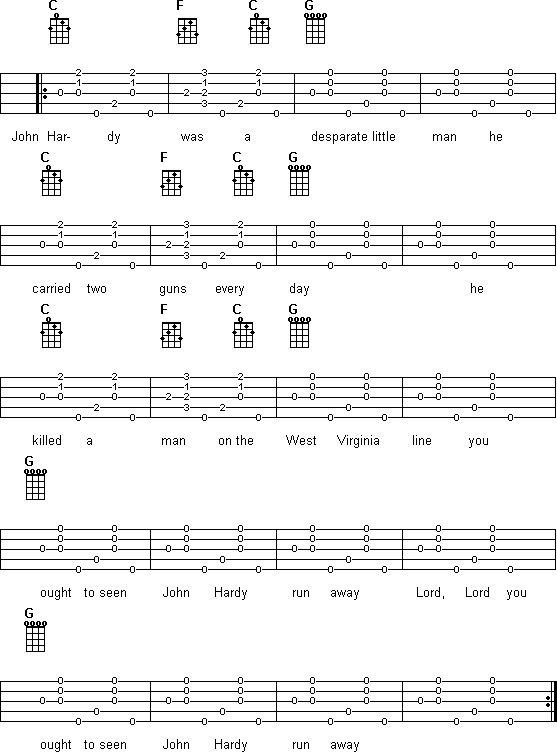
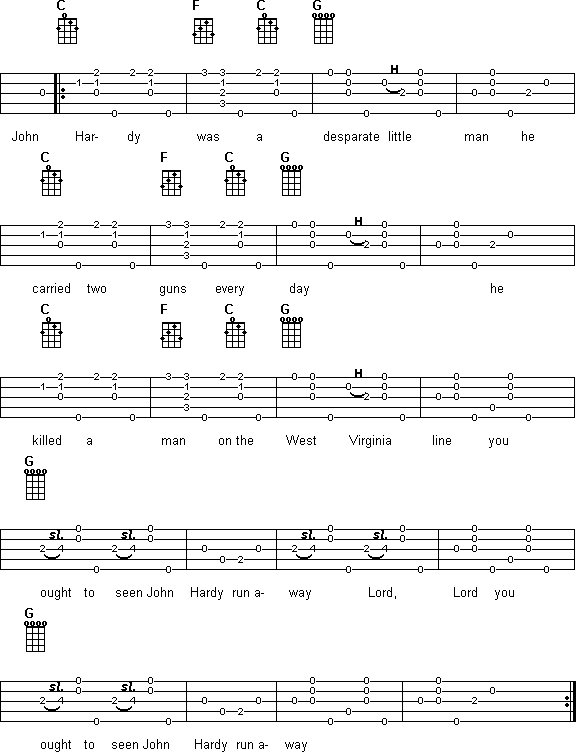
John hardy was a desperate little man
He carried two guns every day
He killed a man on the West Virginia Line
You ought to seen John Hardy run away Lord, Lord
You ought to seen John Hardy run away
John Hardy ran for that old state line
It was there he thought he would go free
But a man walked up and took him by the arm saying,
"Johnny walk along with me" Lord, Lord
"Johnny walk along with me"
Well the first girl to visit John Hardy in his cell
Was a little girl dressed in blue
She came down to that old jail cell saying,
"Johnny I've been true to you" Lord, Lord
"Johnny I've been true to you"
The next girl to visit John Hardy in his cell
Was a little girl dressed in red
She came down to that old jail cell saying.
"Johnny I'd rather see you dead" Lord, Lord
"Johnny I'd rather see you dead"
John Hardy stood in that old jail cell
The tears were running from his eyes
He said "I've been the death of many a poor boy,
But my six shooter never told a lie" Lord, Lord
"My six shooter never told a lie"
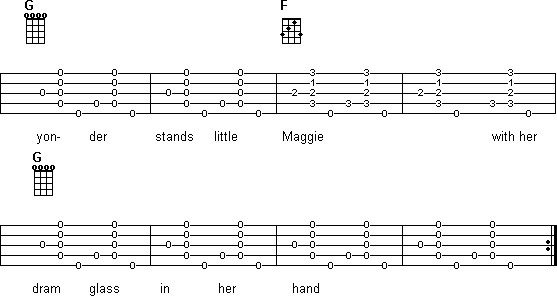
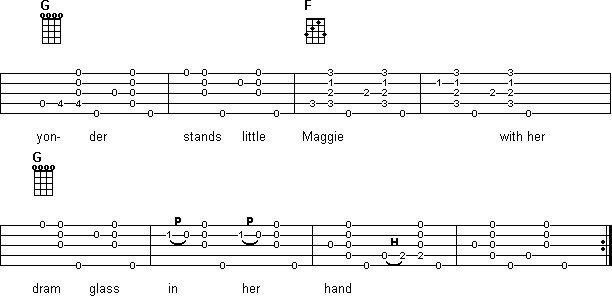
Yonder stands little Maggie
With a dram glass in her hands
She's drinking away her troubles
She's courting another man
Tell me how can I ever stand it
Just to see those bright blue eyes
They're shining like a diamond
Like a diamond in the sky
Sometimes I have a nickel
Sometimes I have a dime
And sometimes I have ten dollars
Just to buy little Maggie some wine
She's marching to the station
With her suitcase in her hand
She's going for to leave me
She is bound for some distant land
Pretty flowers were made for blooming
Pretty stars were meant to shine
Pretty Girls were made for boys to love
Little Maggie was made for mine
The first time I saw little Maggie
She was sitting on the banks of the sea
A forty-four strapped to her shoulder
And a banjo on her knee
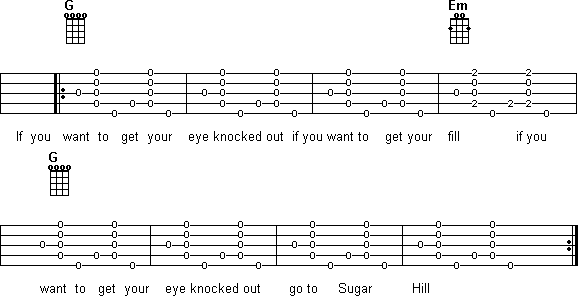
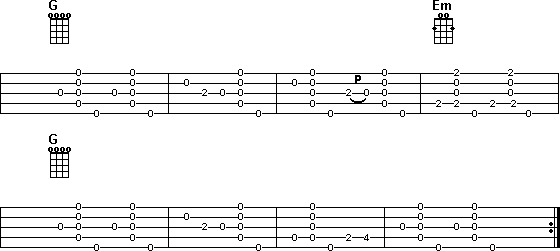
If you want to get your eye knocked out.
If you want to get your fill
If you want to get your eye knocked out
Go to Sugar Hill
I'm getting lonesome for my gal.
I want a drink of rye.
I'm a-going to Sugar Hill
or know the reason why.
Get your banjo off the wall.
Grab your fiddle, Bill.
Hitch the horses to the sleigh,
we're going to Sugar Hill
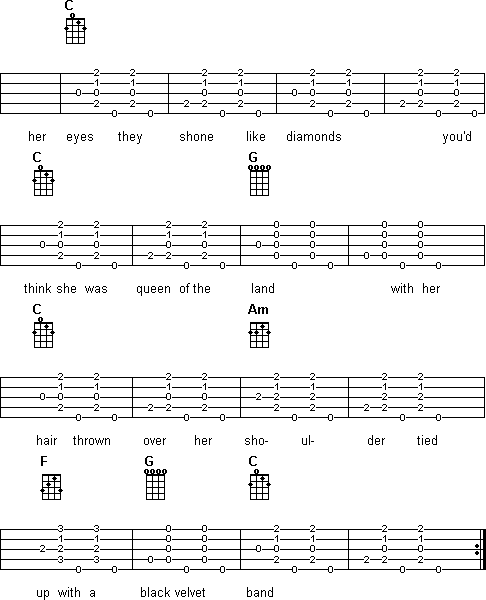
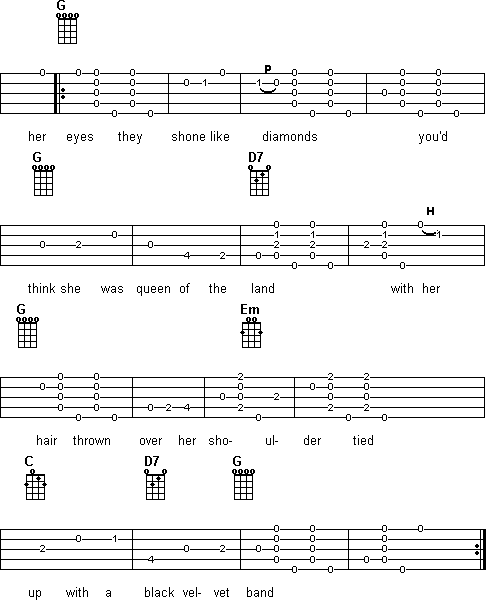
Her eyes shone like diamonds
You'd think she was queen of the land
With her hair thrown over her shoulder
Tied up with a black velvet band
As I went walking one evening
Not meaning to stray very far
When I met with a frolicsome damsel
As she came tripping along
A watch she pulled from her pocket
And slipped it right into my hand
On the very first day that I met her
Bad luck to the black velvet band
Before judge and jury next morning
For trial we had to appear
A gentleman claimed his jewelry
and the case against us was quite clear
Seven long years transportation
Right down to Van Dieman's Land
Far away from my friends and companions
To follow the black velvet band
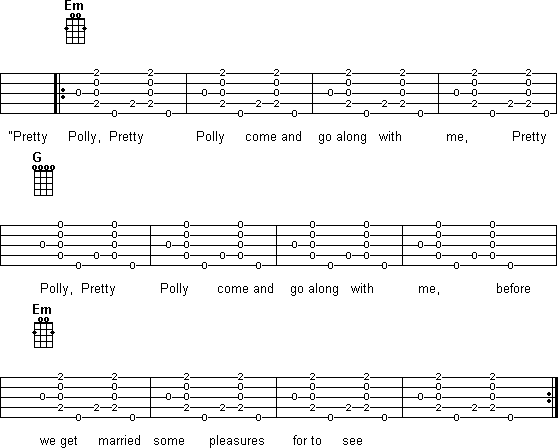
Polly, pretty Polly come and go along with me
Polly, pretty Polly come and go along with me
Before we get married some pleasures to see
She jumped on behind him and away they did go
She jumped on behind him and away they did go
Over the hills and the valley below
They went a little farther and what did they spy
They went a little farther and what did they spy
But a new dug grave with a spade lying by
"Oh Willie, oh Willie I'm afraid of your ways
Oh Willie, oh Willie I'm afraid of your ways
I'm afraid you will lead my poor body astray"
"Pretty Polly, pretty Polly you've guessed about right
Pretty Polly, pretty Polly you've guessed about right
I've been digging your grave for most of the night"
He threw her on the ground and she burst into tears
He threw her on the ground and she burst into tears
She threw her arms around him and trembled with fear
"There's no time to talk now and no time to stand
There's no time to talk now and no time to stand"
He drew out his knife with his right hand
He stabbed her in the heart and the blood it did flow
He stabbed her in the heart and the blood it did flow
And into the grave pretty Polly did go
He threw on some dirt and he started for home
He threw on some dirt and he started for home
Leaving her behind where the wild birds do moan
Now a debt to the devil Willie must pay
Now a debt to the devil Willie must pay
For killing pretty Polly and running away
No MIDI and no "melody" tab with this one. The structure of the song is so simple it's better if you work it out on your own.
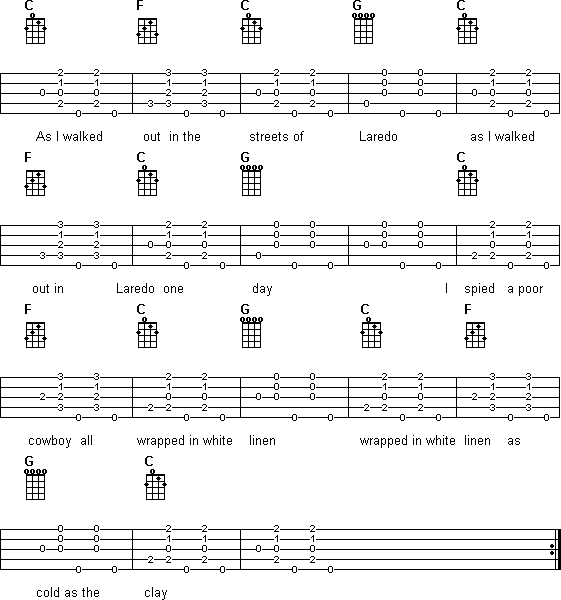
As I walked out in the streets of Laredo
As I walked out in Laredo one day
I spied a poor cowboy all wrapped in white linen
all wrapped in white linen as cold as the clay
"I can see by your outfit that you are a cowboy"
these words he did say as I proudly stepped by
"Come sit down beside me and hear my sad story,
got shot in the breast and I know I must die."
'twas one in the saddle I used to go roaming
'twas once in the saddle I used to go gay
'twas first to the drinking and then the card playing.
Got shot in the breast and I'm dying today."
"Let six jolly cowboys come carry my coffin.
Let six pretty girls come carry my pall.
Throw bunches of roses all over my coffin
throw roses to deaden the clods as they fall."
"Oh beat the drum slowly and play the fife lowly
and play the dead march as you carry me along.
Take me to the green valley and lay the earth o'er me
for I'm a poor cowboy and I know I've done wrong."
Oh we beat the drum slowly and played the fife lowly
and bitterly wept as we carried him along
for we all loved out comrade
so brave, young and handsome
we all loved out comrade although he'd done wrong.
No MIDI and no "melody" tab with this one. The structure of the song is so simple it's better if you work it out on your own.
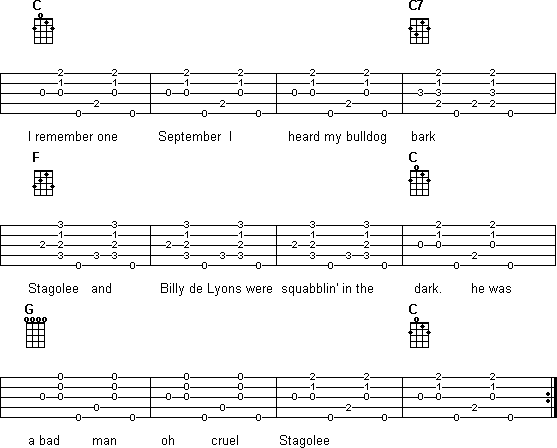
One thing to keep in mind with country blues tunes like
"Stagolee" and "Frankie
And Johnny" is that the blues is a pretty freeform musical style.
Every blues guitar
player has put his or her own stamp on these songs and as a result
it's rare to hear them
played the same way by two different musicians.
The tab for "Stagolee" and "Frankie And Johnny" presented here
is intended only
to get your gears working about the rhythmic possibilities of the
songs. Don't fret about
getting every note perfect. Just grab a groove and let your mojo
do the rest
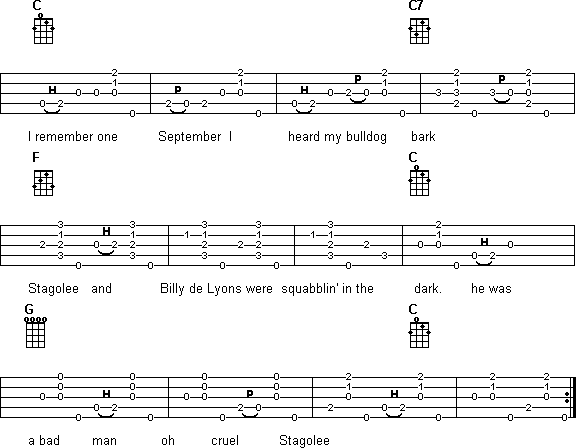
Stagolee was a bad man
Everybody knows
He Spent one hundred dollars
Just to buy a suit of clothes
He was a bad man, oh cruel Stagolee
Stagolee shot Billy de Lyons
What do you think about that?
Shot him down in cold blood
Because he stole his Stetson hat
He was a bad man, oh cruel Stagolee
Billy de Lyons said, "Stagolee
Please don't take my life
I've got two little babies
And a darling, loving wife
You're a bad man, oh cruel Stagolee"
"What do I care about your two little babies
Or your darling, loving wife?
You done stole my Stetson hat
and I'm bound to take your life"
He was a bad man, oh cruel Stagolee
The judge said, "Stagolee, what are you doing here?
You done shot Billy de Lyons
You're going to die in the electric chair
You're a bad man, oh cruel Stagolee"
Twelve o'clock they killed him
With his head held up high
Twelve o'clock they killed him
I was glad to see him die
He was a bad man, oh cruel Stagolee
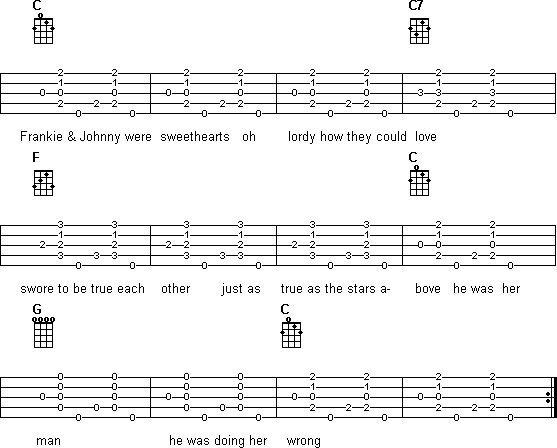
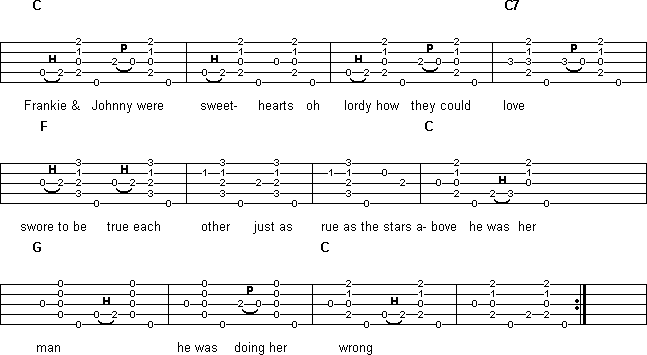
Frankie and Johnny were sweethearts
oh Lordy how they could love
Swore to be true to each other
Just as true as the stars above
He was her man, he was doing her wrong
Frankie was a good woman
As everybody knows
Every dollar that Frankie made
Went into Johnny's hand
He was her man, he was doing her wrong
Frankie went down to the corner
To buy a bucket of beer
Said; "Mr. bartender
Has my loving Johnny been here?"
He was her man, he was doing her wrong
"Now, I don't want to tell no stories
and I don't want to tell no lies
I saw your man an hour ago
With a gal named Alice Bly"
He was he man, he was doing her wrong
Frankie went down to the hotel
Didn't go there for fun
Underneath her kimono
She carried a forty-four gun
He was her man, he was doing her wrong
Frankie looked over the transom
And found to her great surprise
There on the bed sat Johnny
Loving up Alice Bly
He was her man, he was doing her wrong
Frankie got down from that high stool
She didn't want to see no more
Rooty-toot-toot three times she did shoot
Right through that hardwood door
He was her man, he was doing her wrong
The first time Frankie shot Johnny
He let out an awful yell
The second time she shot him
There was a brand new face in hell
He was her man, he was doing her wrong
"Roll me over easy
Roll me over slow
Roll me on to my side
The bullet hurts me so"
He was her man, he was doing her wrong
Sixteen rubber-tired carriages
And sixteen rubber-tired hacks
Took poor Johnny to the graveyard
They ain't gonna bring him back
He was her man, he was doing her wrong
Frankie looked out of the jailhouse
To see what she could see
All she could hear was a two-string bow
Playing Near My God To Thee
He was her man, he was doing her wrong
Frankie she said to the sheriff
"What do you recon they'll do?"
Sheriff said, "Frankie
It's the electric chair for you"
He was her man, he was doing her wrong
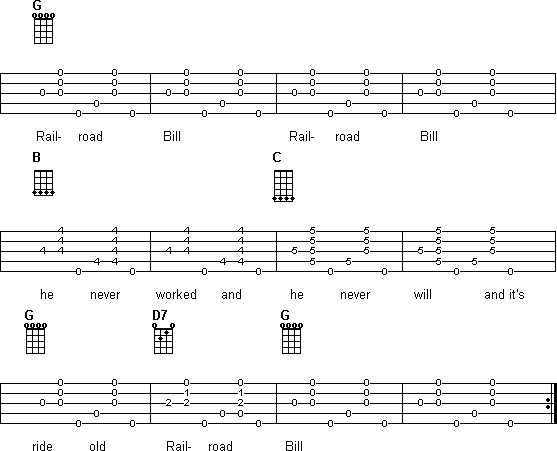
Railroad Bill, Railroad Bill
He never worked and he never will
And it's ride old Railroad Bill
Railroad Bill was a mighty mean man
He shot the midnight lantern out
The breakman's hand
And it's ride old Railroad Bill
I've got a 38 special on a 45 frame
How can I miss when I've got dead aim?
And it's ride old Railroad Bill
Going up a mountain going out west
38 special sticking out my vest
And it's ride old Railroad Bill
No MIDI and no "melody" tab with this one. The structure of the song is so simple it's better if you work it out on your own.
Verse:
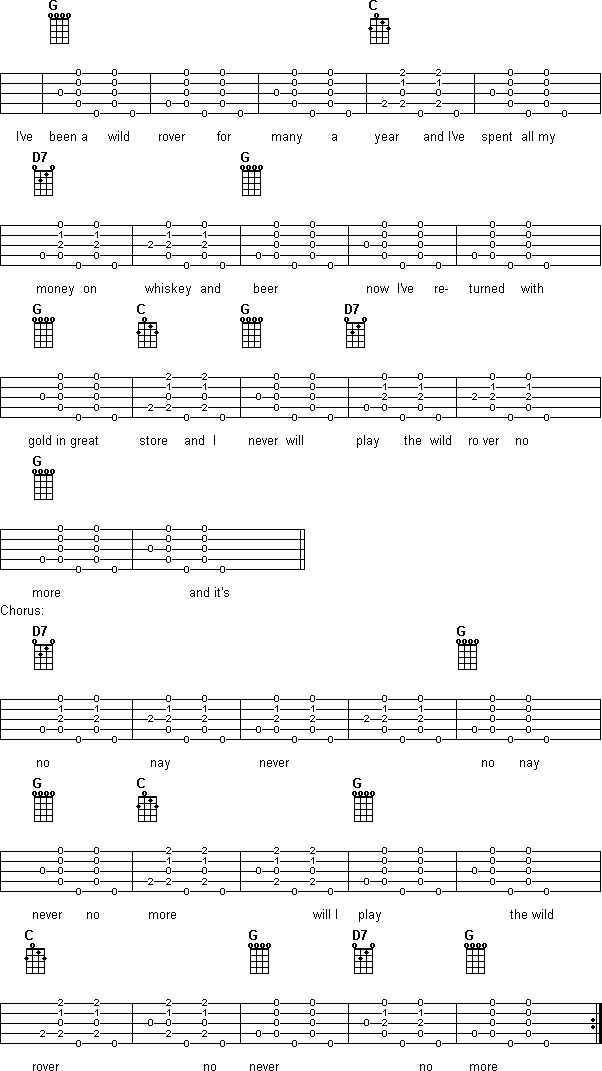
I am not going to tab out an instrumental for the chorus of this
song because an awful
lot of people will expect you to stop playing and clap your hands
during the chorus.
It works like this:
And it's no, nay never (CLAP! CLAP! CLAP!)
No, nay never no more
Will I play the wild rover. . .
Depending on where you are the three claps can be replaced with
pints of Guinness
being slammed on the table
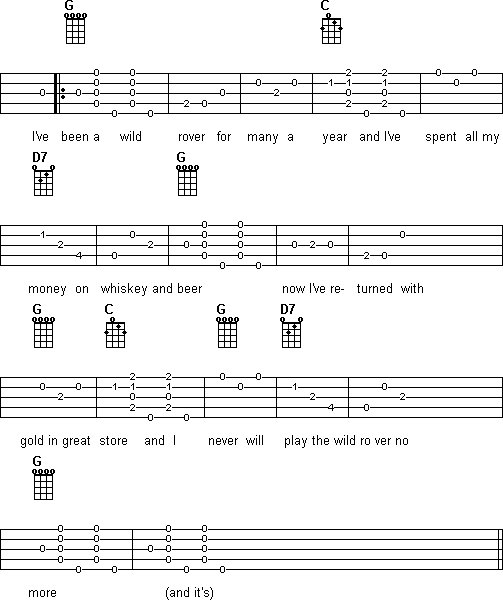
I've been a wild rover for many a year
And I've spent all my money on whiskey and beer
But now I've returned with gold in great store
And I'll never, no never play the wild rover no more
Chorus:
And It's no, nay, never
No, nay, never, no more
Will I play the wild rover
no never, no more
I went to a pub I used to frequent
I told the landlady my money was spent
I asked her to trust me, her answer was "Nay,
Such custom as yours we can get any day"
Then out of my pocket I took sovereigns bright
And the landlady's eyes opened wide with delight
She said, " I have whiskies and wines of the best
And the words that I said, sure, were only in jest
"You can keep all your whiskey and likewise your beer too
For not another penny I am spending with you
For the money I've got, mum, I'm taking good care
And I never will play the wild rover no more"
I'll go home to my parents and tell what I've done
And ask them to pardon their prodigal son
And if they forgive me as they've done before
I never, no never, will play the wild rover no more
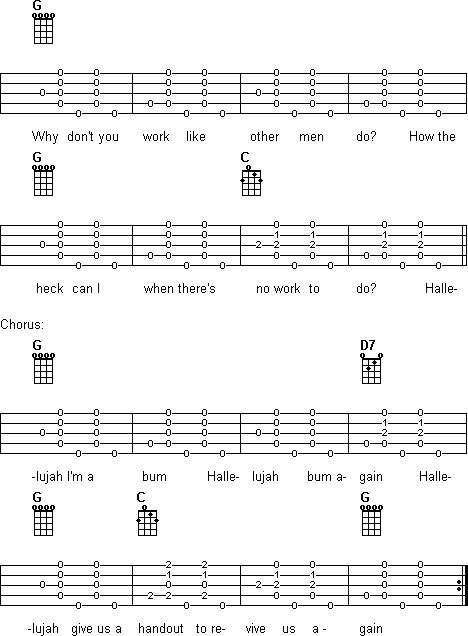
Oh why don't you work like other men do?
How the heck can I work when there's no work to do?
Chorus:
Hallelujah! I'm a bum
Hallelujah! Bum again
Hallelujah! Give us a handout
To revive us again
Oh I love my boss and my boss loves me
And that is the reason I'm so hungry
Oh Springtime has come, and I'm just out of jail
Without any money, and without any bail
I went to a house and knocked on the door
The lady said, "Run, bum, you've been here before"
When springtime does come, oh won't we have fun?
We'll throw up our jobs and we'll go on the bum!
If I was to work and save all I earn
I could buy me a bar and have money to burn
I passed by a saloon and heard someone snore
I found the bartender asleep on the floor
I stayed there and drank till a copper came in
And he put me to sleep with a tap on the chin
Next morning in court I was still in a haze
The judge looked at me and said, "Thirty days"
No MIDI and no "melody" tab with this one. The structure of the song is so simple it's better if you work it out on your own.
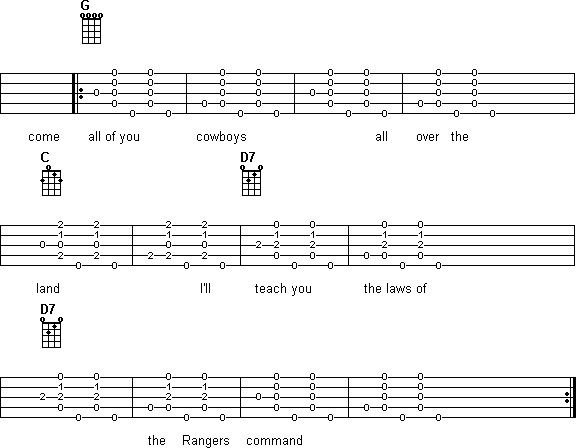
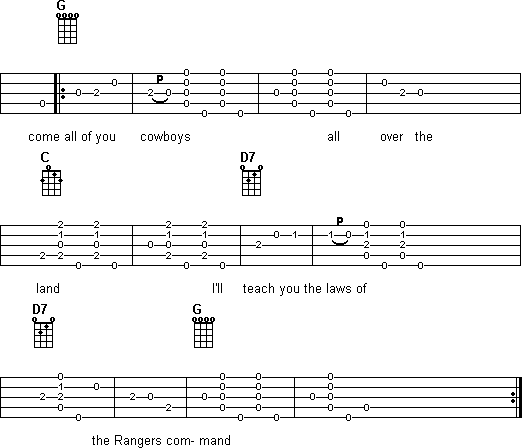
Come all of you cowboys
All over the land
I'll teach you the laws of
The Rangers command
To hold a six shooter
And never to run
And long as there's bullets
In one of your guns
I met a fair maiden
Who's name I don't know
I asked her to the round up
With me she would go
She said she'd go with me
To the old round up
And drink that hard liquor
Form a cold bitter cup
We started for the canyons
In the fall of the year
Expecting to stay there
With a herd full of steer
But the rustlers broke on us
In the dead of the night
She rose from her warm bed
A battle to fight
She rose from her warm bed
With a gun in each hand
Saying, "Come all you cowboys
and fight for your land"
"Come all of you cowboys
and don't ever run
As long as there's bullets
In one of your guns"
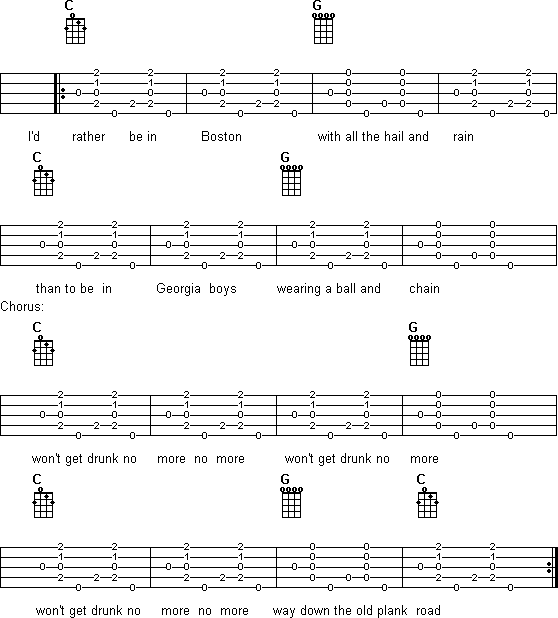
There is an unwritten rule out there somewhere that every banjo
songbook has to have
at least one song in an alternate tuning. A friend of mine thinks
this tradition
originated from the coalmines of New Jersey.
"Way Down The Old Plank Road" is a great tune to experiment with
in double C
tuning.
In double C tuning you are going to tune your forth
and second strings to C Giving you these new chord
positions to work with.
You might notice that making an actual G chord is kind
of awkward. 99% of the time you can get away with
making your G chord like this:
Give it a shot!
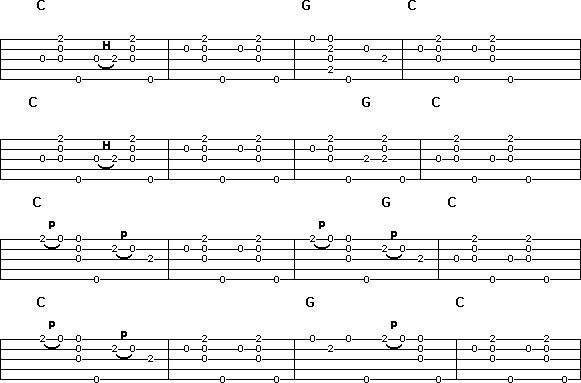
Rather be in Richmond, midst all the hail and rain,
Than for to be in Georgia boys, wearing that ball and chain
Chorus:
Won't get drunk no more, won't get drunk no more,
Won't get drunk no more, way down on the old plank road
I went down to Mobile for to get on the gravel train,
Very next thing heard of me, had on a ball and chain
Dony, oh dear Dony, what makes you treat me so?
Caused me to wear the bail and chain, now my ankle's sore
Knoxville is a pretty place, Memphis is a beauty
If you want to see them some pretty girls, hop to Chattanoogie
I'm going to build a scaffold on some mountain high
So I can see my Dora girl as she goes riding by
My wife died on Friday night, Saturday was buried
Sunday was my courting day, Monday I was married
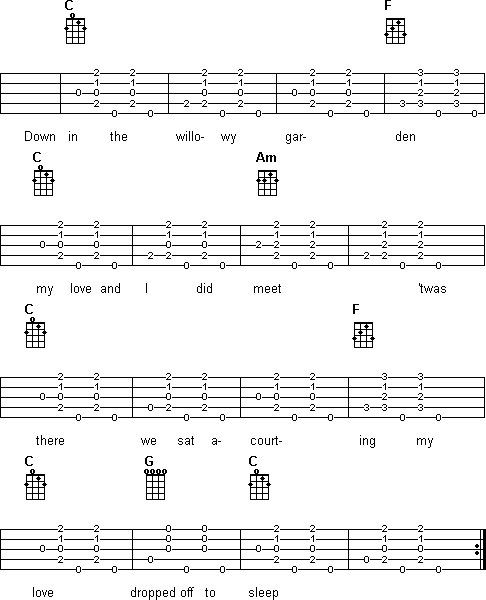
Down in the willowy garden
My love and I did meet
'Twas there we sat a-courting
My love dropped off to sleep
I had a bottle of burgundy wine
Which my true love did not know
And there I poisoned that dear little girl
Down under the banks below
I stabbed her with my dagger
Which was a bloody knife
I threw her in the river
Which was a dreadful sight
My father often told me
That money would set me free
If I would murder that dear little girl
Whose name was Rose Connelly
And now he sits in his cottage door
A-wiping his weeping eye
And now he waits for his own dear son
Upon that scaffold high
My race is run beneath the sun
Cruel Hell's now waiting for me
For I have murdered my own true love
Who's name was Rose Connelly
No MIDI and no "melody" tab with this one. The structure of the song is so simple it's better if you work it out on your own.
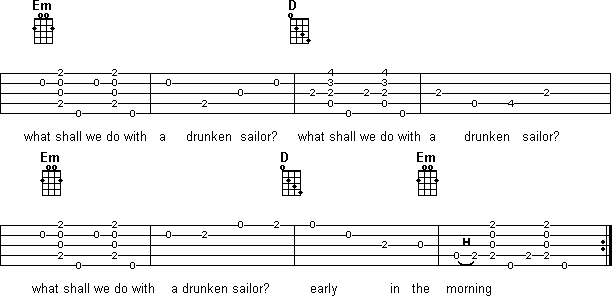
What shall we do with a drunken sailor?
What shall we do with a drunken sailor?
What shall we do with a drunken sailor?
Early in the morning
Chorus:
Way hey up she rises
Way hey up she rises
Way hey up she rises
Early in the morning
Shave his belly with a rusty razor
Shave his belly with a rusty razor
Shave his belly with a rusty razor
Early in the morning
Put him in the longboat till he's sober
Put him in the longboat till he's sober
Put him in the longboat till he's sober
Early in the morning
Put him in the suppers with a hose pipe on him
Put him in the suppers with a hose pipe on him
Put him in the suppers with a hose pipe on him
Early in the morning
Heave him by the leg in a running bowline
Heave him by the leg in a running bowline
Heave him by the leg in a running bowline
Early in the morning
Put him in the bilge and make him drink it
Put him in the bilge and make him drink it
Put him in the bilge and make him drink it
Early in the morning
Keel haul him till he's sober
Keel haul him till he's sober
Keel haul him till he's sober
Early in the morning
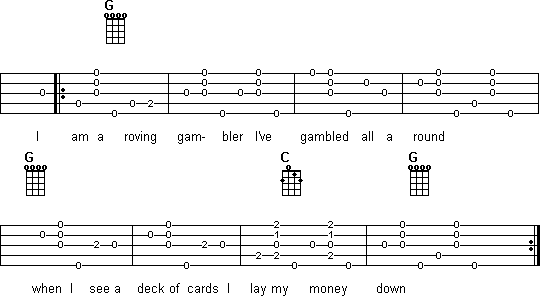
I am a roving gambler I've gambled all around
When I see a deck of cards I lay my money down.
I've gambled down in Washington I've gambled over in Spain
I'm on my way to Georgia to knock down my last game.
When I was down in Washington many more weeks than three
I fell in love with a pretty little girl and she fell in love with
me.
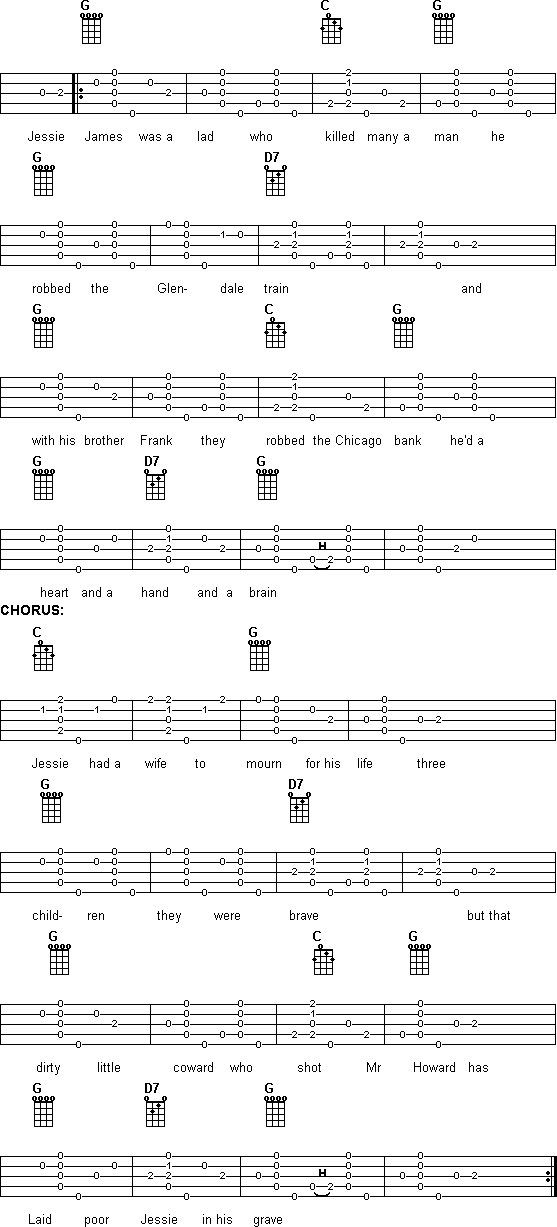
Jessie James was a lad who killed many a man
He robbed the Glendale train
And with his brother Frank he robbed the Chicago bank
He'd a heart and a hand and a brain
Chorus:
Jessie had a wife to mourn for his life
Three Children they were brave
But that dirty little coward who shot Mr. Howard
Has laid poor Jessie in his grave
It was Robert Ford, that dirty little coward
I wonder how he does feel
For he ate of Jessie's bread and slept in Jessie's bed
And he laid poor Jessie in his grave
It was on a Wednesday night and
the moon was shining bright
They robbed the Glendale train
And the people they did say for many miles away
It was robbed by Frank and Jessie James
Jessie James was a man, a friend to the poor
He'd never see a man suffer pain
And with his brother Frank, he robbed the Chicago bank
And stopped the Glendale train
It was his brother Frank who robbed the Gallatin bank
And carried the money from the town
It was in this very place they had a little race
For they shot Captain Sheets to the ground
It was on a Sunday night and Jessie was at home
Talking with his family brave
Robert Ford came along like a thief in the night
And laid poor Jessie in his grave
The people held their breaths when they heard of
Jessie'sdeath
And wondered how he came to die
It was one of his gang called Little Robert Ford
He shot poor Jessie on the sly
This song was made by Billy Gashade
As soon as news did arrive
He said there was no man with the law in his hand
Who could take Jessie James when alive
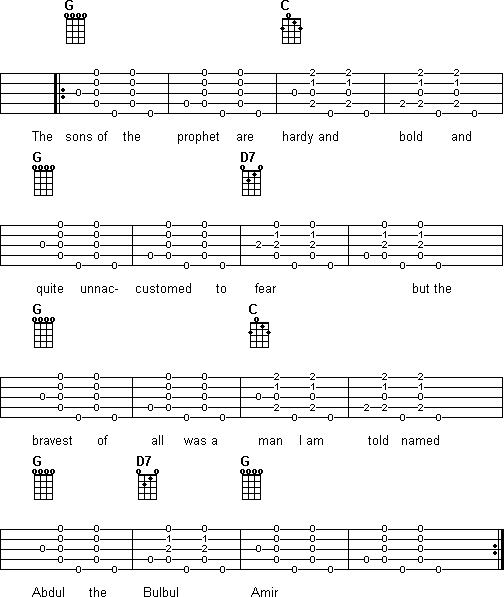
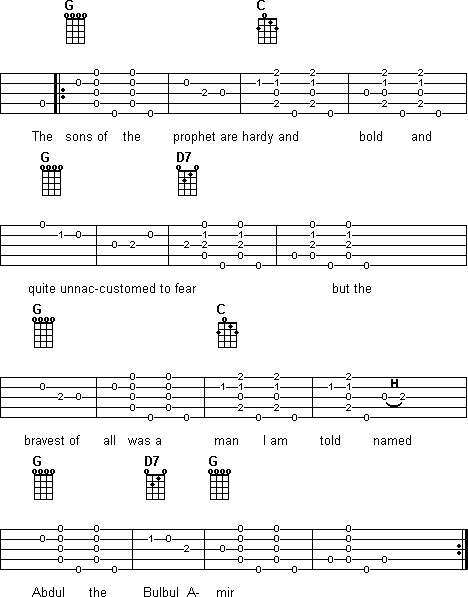
The sons of the prophet are hardy and bold
And quite unaccustomed to fear
But the bravest of all was a man I am told
Named Abdul, The Bubul Amir
When they needed a man to encourage the van
Or harass a foe from the rear
Storm fort or redoubt, they had only to shout
For Abdul, The Bubul Amir
Now the heroes were plenty and well known to fame
Who fought for the ranksofthe Czar
But the bravest of these was a man by the name
Of Ivan Skavinsky Skivar
He could imitate Irving, play poker and pool
And strum the Spanish guitar
In fact, quite the cream of the Muscovite team
Was Ivan Skavinsky Skivar
The ladies all loved him, his rivals were few
He could drink them all under the bar
A gallant or tank, there was no one to rank
With Ivan Skavinsky Skivar
One day this bold Russian had shouldered his gun
And donned his most truculent sneer
Downtown he did go where he trod on the toe
Of Abdul, The Bubul Amir
"Young man," said Bubul, "has your life grown so dull
That you're anxious to end your career?
Vile infidel, know you have trod on the toe
Of Abdul, The Bubul Amir"
"So take your last sunshine and brook,
And send your regrets to the Czar.
By which I imply, you are going to die
Mr. Ivan Skavinsky Skivar."
Said Ivan, "my friend, your remarks in the end
Will avail you little I fear;
For you will never survive to repeat them alive
Mr. Abdul, The Bubul Amir"
Then that bold Mameluke drew his trusty skibouk
With a cry of "Allah Akbar.:
And with murderous intent he ferociously went
For Ivan Skavinsky Skivar
They fought all that night 'neath the pale yellow moon
The din it was heard from afar
And huge multitudes came,
so great was the fame Of Abdul and Ivan Skivar
As Abdul's long knife was extracting the life
In fact, he had shouted "Huzzah!"
He felt himself struck by that wily Calmuck
Count Ivan Skavinsky Skivar
The sultan drove by on his red breasted fly
Expecting the victor to cheer
But he only drew night to hear the last sigh
Of Abdul, the Bubul Amir
Czar Petrovich too, in his spectacles blue
Rode up in his new crested car
he arrived just in time to exchange a last line
With Ivan Skavinsky Skivar
There's a tomb rises where
The Blue Danube rolls
And 'graved there in characters clear
Are, "Stranger when passing, oh pray for the soul
Of Ivan Skavinsky Skivar
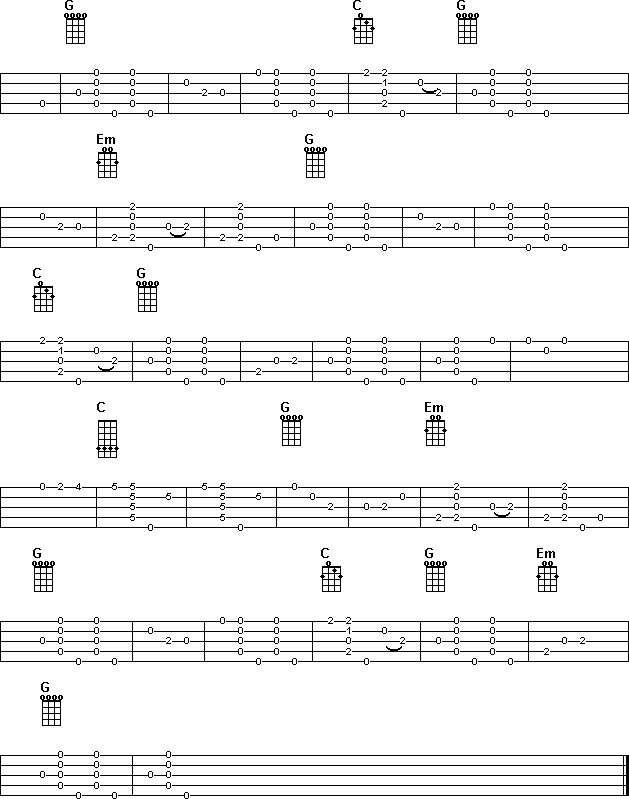
I've traveled this world all over
And now to another I go,
And I know that good quarters are waiting
For to welcome old Rosin the Beau.
To welcome old Rosin the Beau
To welcome old Rosin the Beau
I know that good quarters are waiting
For to welcome old Rosin the Beau.
When I'm dead and laid out on the counter,
A voice you will hear from below,
Saying send down a hogshead of whisky
To drink with old Rosin the Beau.
To drink with old Rosin the Beau
To drink with old Rosin the Beau
Saying send down a hogshead of whisky
To drink with old Rosin the Beau
And get a half dozen stout fellows
And stack them all in a row
Let them drink out of half gallon bottles
To the memory of Rosin the Beau
To the memory of Rosin the Beau
To the memory of Rosin the Beau
Let them drink out of half gallon bottles
To the memory of Rosin the Beau
Get this half dozen stout fellows
And let them all stagger and go
And dig a hole in the meadow
And in it put Rosin the Beau
And in it put Rosin the Beau
And in it put Rosin the Beau
And dig a hole in the meadow
And in it put Rosin the Beau
Grab a couple of bottles
Put them at my head and my toe
With a diamond ring scratch on them
The name of old Rosin the Beau
The name of old Rosin the Beau
The name of old Rosin the Beau
With a diamond ring scratch on them
The name of old Rosin the Beau
I feel that tyrant approaching
That cruel remorseless foe
But I lift my glass in his honor
Take a drink with old Rosin the Beau
Take a drink with old Rosin the Beau
Take a drink with old Rosin the Beau
But I lift my glass in his honor
Take a drink with old Rosin the Beau
Books by Patrick Costello: